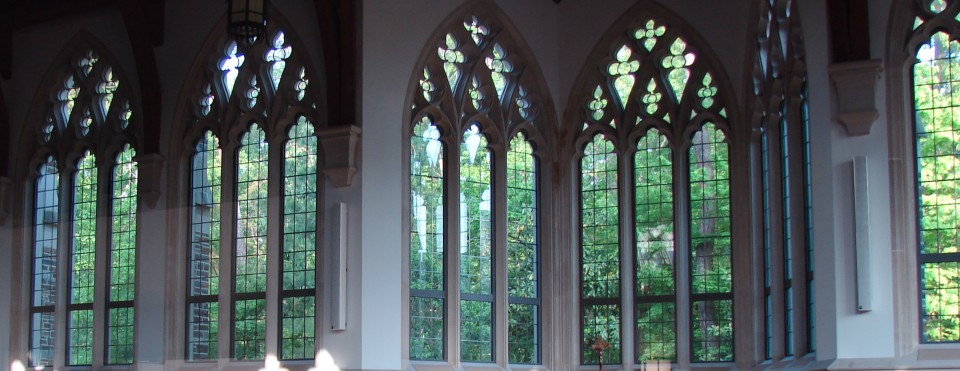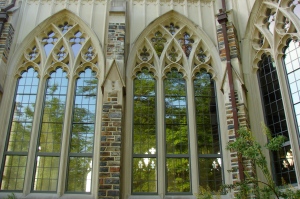Tags
Acts of the Apostles, doctoral study, duke divinity school, faith, good work, graduate school, imagination, pedagogy, religion, seattle pacific university, stories, teaching, theological education, theology, university life
I recently had occasion to consider how the last twelve years of my own theological education have formed my perspective on what theological education should be, and why I want to participate in the theological education of others. Foremost, I view the world theologically. As the psalmist declares, this world and everything in it belong to God (Psalm 24:1). God is not an object in the universe, but the Creator and Lord of everything that exists; God is the measure of all things. If God is the measure of all things, and theology encompasses all thought, speech and reasoning about God, then a person’s theology will govern her thought, speech, and reasoning about all else. Theology is inextricable from an entire way of life. Theology matters “all the way down.” So viewing the world theologically involves measuring my life on God’s terms. Human beings cannot reflect God’s life in the abstract; doing so requires a particular story. Christians stake their lives on the reality of God’s story as told in Scripture and summarized in the Apostles’ and Nicene creeds. Theological educators should invite students to know the God of that story and explore this world as God’s world. Christian theological education should unite the conviction that God is the measure of all things with the distinct content of God’s story that Christians confess, and should use all the resources of the academy that serve the living knowledge of this story.
All my post-secondary schooling has taken place in institutions committed to this perspective on theological education, which has shaped my work profoundly. After graduating from Seattle Pacific University’s School of Theology, I came to Duke Divinity School—first for the M.Div. and now the Th.D.—because I sought academically rigorous study integrated with Christian confession and, ultimately, a doctorate oriented toward ecclesial life. I named my major area “Christian Scripture,” because these words together identify the community whose presuppositions and story frame all my work. I have focused on discerning what habits and skills make faithful ecclesial reading of Scripture possible and developing them. I have learned to use whatever academic tools prove helpful for understanding the Bible as Christian Scripture—that is, as witness to God’s self-revelation, and indispensable and authoritative for ecclesial life.
I exercise this training every time I sit down to work on my dissertation, which engages the portrait of “witness” in the book of Acts as a whole, to the end of illuminating a Christian ethic of reading Scripture. Acts portrays a community endeavoring to live out the conviction that the God revealed in Jesus is the measure of all things. This community must articulate its identity not only for itself but also to an entire range of others, who run the gamut from eagerly receptive to violently hostile. Acts is peculiarly concerned with matters Christians must consider whenever we try to make ourselves intelligible to those who do not share our epistemic assumptions or our deepest convictions. The book of Acts, and especially its idiom of witness, offers resources for thinking through how Christians can rightly make claims to knowledge of God. “Witness” in Acts holds together precisely what theological education should: the conviction that God is the measure of all things with the particular story of Israel’s God revealed definitively in Jesus’ life, death, and resurrection.
My reasons for writing this dissertation correspond to three main challenges I see facing 21st Century theological educators:
1) Remaining committed to God as the measure of all things even as we work in American higher education, which requires that we neither reject entirely the prevailing epistemic paradigm nor measure all our claims to knowledge on its terms,
2) Reshaping study habits formed by easy access to information, which inhibit the careful attention that learning to know God requires, and
3) Maintaining the close connection between thought and life that the truthfulness of our convictions demands.
My thinking about these challenges continues to evolve, but here I offer how I am currently considering the way forward.
1) Because Christian theology begins from the presupposition that God is the measure of all things, working within American higher education presents a peculiar challenge. Modern people, whether in the academy or otherwise, are unaccustomed to considering God the measure of all things. Rather, modern people accord epistemic preeminence to science and history—disciplines that trade in encyclopedic knowledge and assume the reliability of human sensory experience. On one level, trusting historical and scientific judgments makes good sense. Christians, too, rely upon these disciplines and their epistemic underpinnings in our daily lives, but we cannot accord them epistemic preeminence without undermining our faith. Indeed, excellent scholarship requires that we use whatever tools its disciplines make available, but our commitment to reading the world on God’s terms obliges us to consider more and different possible realities than these tools alone can make available. All Christians, but especially those who work and teach in the theological disciplines, must develop the intellectual agility to use the tools of modern scholarship while not adopting its epistemology and, instead, maintaining the conviction that God is the measure of all things.
Such agility involves recognizing our single identity as one and the same person whether writing, teaching in the classroom, or participating in worship. The scholar and the Christian do not come apart. The practical form of such agility will vary according to discipline and the scholarly tools most appropriate to the kind of theological claims one makes. Modern theological study of the Bible, for example, can and should make use of historical-critical tools in order help bridge the gap between the Bible’s original context and our own. But biblical scholars should always keep the ultimate object of study in view, and not limit the Bible’s subject matter to historical possibilities.
From the very beginning of my theological training, my mentors have modeled such reading and have encouraged me to hone my skills in this art. As a result, I have not only learned by doing; I have had to think deeply about how such reading works and is possible. I am convinced that the flourishing of the Christian church requires that we continually return to Scripture, so I consider learning the art of faithful reading vital.
2) Theological study requires habits significantly at odds with the methods of information retrieval that both serve and plague our society. Most future college students have never lived without nearly ubiquitous Internet access. A bottomless store of information ready at our fingertips can distort our understanding of what constitutes knowledge, inhibit our ability to judge the quality of information, and hinder us in developing practices of seeking suited to our object. Theological study’s object is God, and knowing God is not quick, easy, or available via Google. Christian Scripture rewards and requires slow, carefully attentive reading. As always, how we know shapes what it is possible to know. Theological educators will have to recall students to slow, careful, methodical observation, and to long and thoughtful mulling. We must resist thinking of knowledge as a commodity—a thing available as a product in the classroom. A theological view on the world requires the constant reminder that knowledge of the deepest reality available to us comes only as a gift from God’s side of the Creator/creature distinction, and can only truly be known through living its truth in communion with others.
3) Living this truth in community is the final and most constant challenge for theological educators. I have already partly addressed this concern in noting that Christians must maintain the integrity of their identity. There can be no real distinction between the scholar and the Christian—no division between “work” and “life.” But living the truth of our convictions demands even more. Theological education exists not for its own sake, but for the flourishing of the church, which likewise exists not for itself, but in ministry to God’s world. Perhaps more than some others, the theologically educated are in danger of calling Jesus, “Lord, Lord,” and not doing what he commands, not following him as his disciples. The good of viewing the world theologically consists, finally, in becoming more like God. Such is the aim of my own life, and the way of life I hope to commend to my students.




It is always the integrity of God’s Word that is at stake, the Devil was backed off with “it is written” we should do no less.
LikeLike